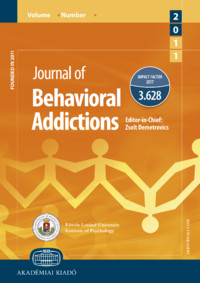Mobile and non-mobile Internet Use Disorder: Specific risks and possible shared Pavlovian conditioning processes
Mobile and non-mobile Internet Use Disorder: Specific risks and possible shared Pavlovian conditioning processes
Commentary on: How to overcome taxonomical problems in the study of Internet use disorders and what to do with “smartphone addiction”? (Montag et al., 2019)
Author(s): Tania Moretta, Shubao Chen, Marc N. PotenzaSubject(s): Behaviorism
Published by: Akadémiai Kiadó
Keywords: Internet; classical conditioning; reward; gaming; addictive behaviors; cues
Summary/Abstract: This commentary addresses a recent article by Montag et al. (2019) about the relevance of distinguishing between mobile and non-mobile Internet Use Disorder (IUD). In response to the review, we reflect on the clinical relevance of this distinction and, in parallel, we propose some Pavlovian conditioning processes as possible mechanisms underlying different IUDs. We believe that, from a clinical point of view, it is of fundamental importance assessing both specific “forms” of IUDs and the underlying mechanisms that would be shared across different IUDs, like multiple and parallel classes of Pavlovian responses and the influences of Internet cues on Internet-related addictive behaviors that may be influenced by the probability of obtaining Internet rewards.
Journal: Journal of Behavioral Addictions
- Issue Year: 9/2020
- Issue No: 4
- Page Range: 938-941
- Page Count: 4
- Language: English

